Dating apps will scale beyond the human
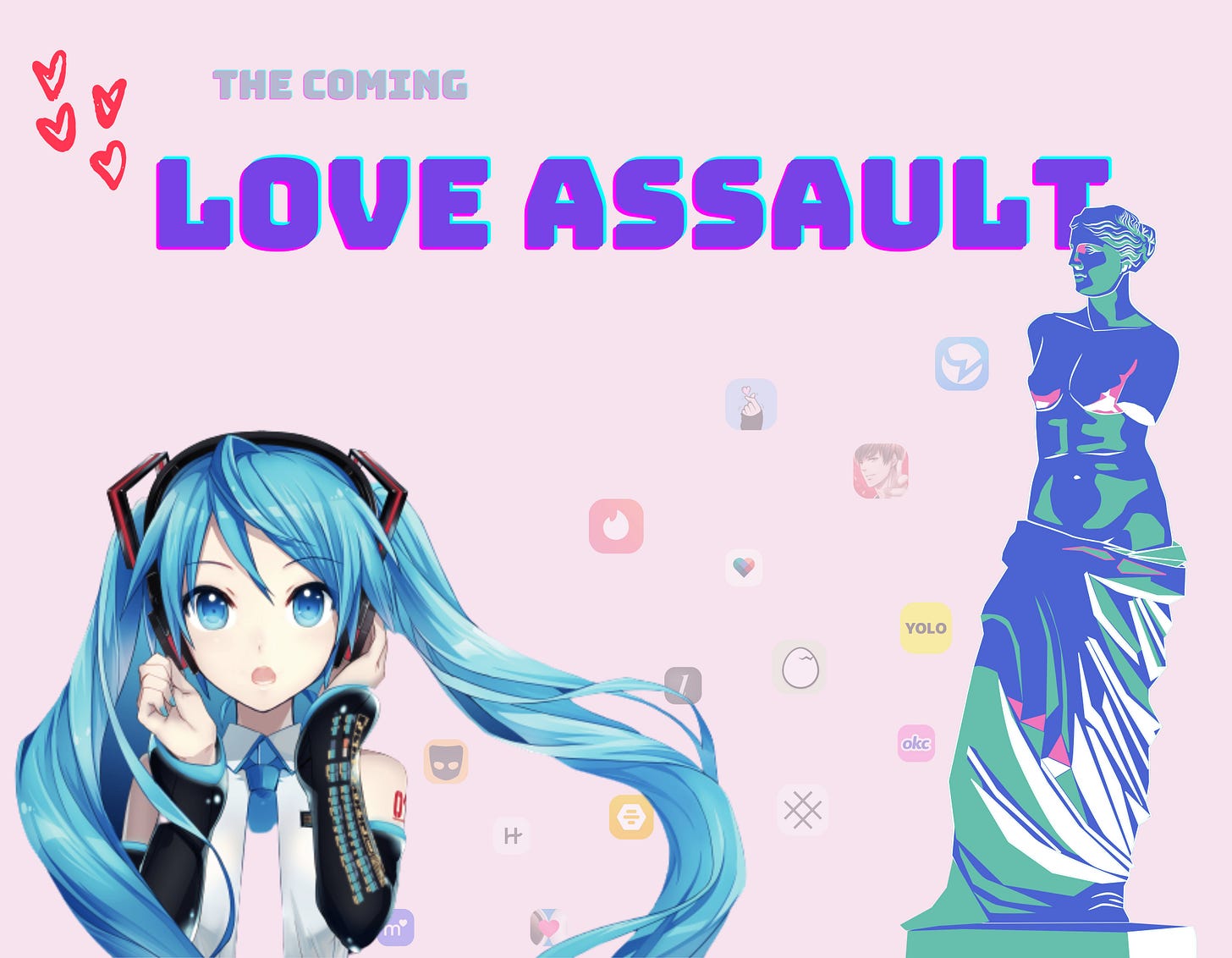
Editor's Letter: The coming love assault
He brought his lips to the ivory, as he had so many times before. Ever since he had observed the women of Cyprus living lives of “vices,” prostituting themselves, King Pumayyaton had chosen to live alone. That was until he made a girl, a statue, “white as snow” with “greater beauty than any girl could have.” So real was she that he brought her gifts — smooth pebbles and pet birds — cladding her in opulent dresses, lustrous jewelry. At night, he put her to bed, pulling the sheets to cover her.
Pumayyaton had spent that day in a state of hope and desperation. Prostrate at the temple of Aphrodite, he prayed:
If you can give
All things, O gods, I pray my wife may be...
One like my ivory girl.
Now, back in his palace, he kissed the statue again. The lips were warm, soft. The ivory had lost its hardness. In astonishment, Pumayyaton watched as the figure transformed into a woman, alive and in love.
The story of Pumayyaton, better known as Pygmalion, is a familiar one. It was captured best by Ovid in Metamorphoses, but we see echoes of it across the canon. The concept of a creator falling in love with his work appears in the art of George Bernard Shaw and Isaac Asimov, Borges and James, Dryden and Tennyson, and countless others.
Retreaded to the point of triteness, there is nevertheless much in the tale that speaks to modern love and modern loneliness.
If there is something that Ovid’s telling captures particularly well it is the astonishment of love. (“It is a body!,” Pumayyaton exclaims to himself.) There is often a dazzling sensation that gilds stories of romantic unions, a sort of is-this-really-happening? disbelief. Perhaps our minds add this after, after love has happened, dropping in a caesura, a stunned thinking pause that allows us to say, in our minds, before life was this way. After: something different. (That’s how I remember it, at least, glancing through the crowd at a dark-haired girl at a picnic table.)
If there is something that’s missed in the story of Pumayyaton, it’s this: serendipity. Surprise. No matter how vivid one’s imagination, the form of one’s lover is never as expected, never the form once confessed to a high school journal, manifested in an adolescent daydream, or carved out of ivory or stone.
That is changing.
While modern dating companies have served customers by abstracting place or form from romantic encounters, a third next wave is arriving that seeks to abstract humanity itself.
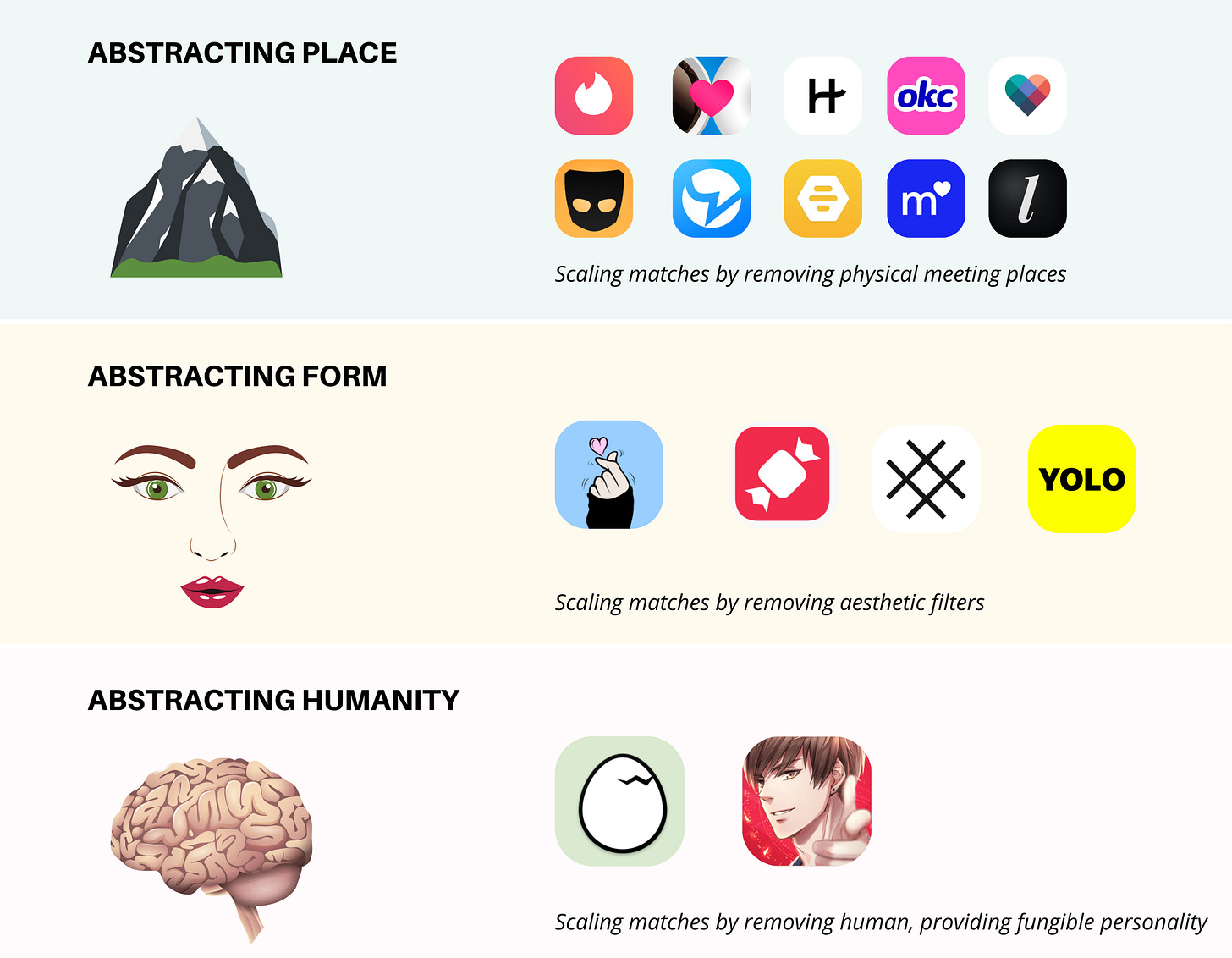
Blued
With much focus on TikTok’s potential US ban, another Chinese company slipped relatively under-the-radar. BlueCity (BLCT), a dating business for the LGTBQ community, listed on the Nasdaq this week, raising $84.8 million at a valuation of $614 million. The company’s app, Blued, has 49 million registered users spanning 210 countries, 49% located in China. Other large markets include India, South Korea, Thailand, and Vietnam. Interestingly, BLCT monetizes in a manner that would have been familiar to King Pumayyaton: gifts. Over live video streams, users can make virtual offerings, whether they be an emoji heart or animated watermelon. That proposition seems to have resonated with the BLCT base: revenue grew 51.5% in 2019 to $108 million.
Though running a differentiated monetization strategy, Blued’s fundamental value is the same as more recognizable names in the category: expanding the top of the funnel. Whether consumers spend their time swiping on Tinder, Bumble, Grindr, Hinge, JDate, or some other app, this is the promise: you will see more people here than you ever could out in the real world.
Scale, scope, a widening aperture, managed through an act of abstraction. In the case of traditional dating apps that is the abstraction of place. Meeting partners is no longer confined to local bars or dog runs or farmer’s markets. Though users typically define some parameters (a radius of a certain number of miles), physical location becomes entirely unimportant within that framework.
This abstraction is especially powerful for marginalized communities that might otherwise struggle to find the serendipity from which dominant cultural groups benefit. A heterosexual man encounters many potential mates over the course of his day. A homosexual man has fewer such opportunities, particularly in intolerant societies. This is the state of affairs in some of Blued’s largest markets: only 37% of Indians believed homosexuality should be accepted by society, while 44% of South Koreans shared that view. This contrasts with America (72%), Canada (85%), Sweden (91%), and many others. Restrained by similar prejudice, only 5% of China’s gay community chooses to come out of the closest.
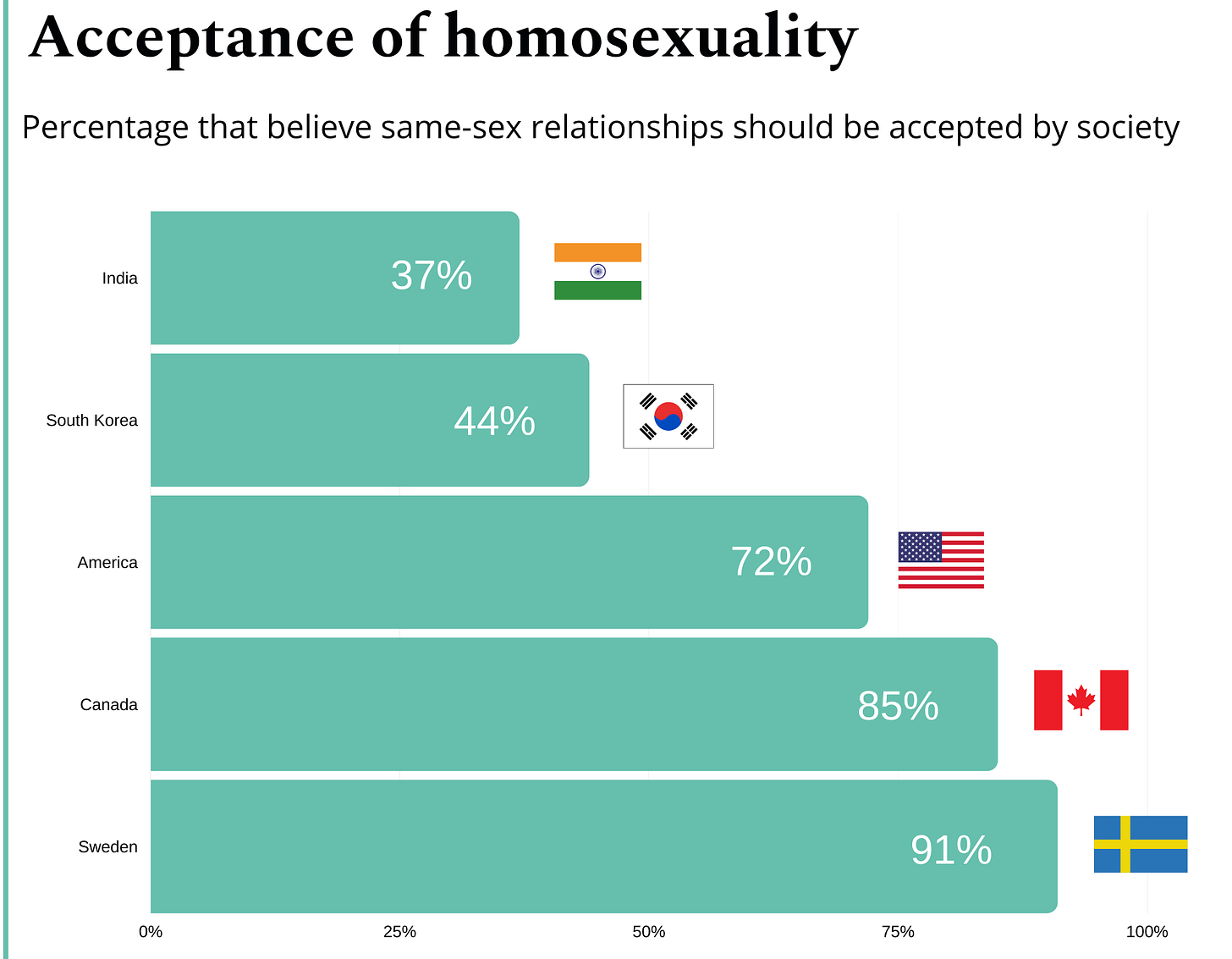
Pew Research
In a snippet of emotive corporate writing, BlueCity’s CEO Ma Baoli shares his experience in the company’s F-1 prospectus. Ma lived as a closeted policeman, pseudonymously founding an online forum for the gay community, before building Blued.
“Gay”—as I typed the word on my computer around 20 years ago, hiding alone in my bedroom, my path ahead was destined to be different…
I was laden with agonizing loneliness, helplessness, and fear of the future during my adolescence. I used to think that I was the only person in the world attracted to people of the same gender and that I was sick and needed treatment. That was why, when I found out on the internet that there were other people like me, and that homosexuality was not an illness or disorder, I felt a tremendous sense of relief and excitement. After all, I’m not alone in this world. After all, we are not sick. After all, love is gender blind.
To me, herein lies the power of the internet—it empowers us to elevate ourselves, and to bring warmth to others across all corners of the world living in loneliness, helplessness and fear because of their sexual orientation.”
This is the power of the first wave of dating apps — to connect individuals, regardless of their location.
Moone
Whereas BlueCity’s Ma talks about the ability to escape place, “bring[ing] warmth to others across all corners of the world,” a newer cohort of apps focus on a different form of abstraction: form.
Browsing and selection on traditional dating apps are primarily visual: you see someone you fancy and you swipe or heart or star or complete some other action to signal your interest.
Companies like Moone take a different approach. Matches are made based on personal interests and personality tests. Looks, physical form, are taken out of the equation as users are prompted to create avatars rather than upload a photo. While real pictures can eventually be shared, that’s beside the point — the focus is on the measurable constellation of features that make a person themselves. Interestingly, the effect is the same for the user: a widening of the funnel. By abstracting the face and other physical attributes, any one of the desired gender becomes a viable match, at least in the short-term.
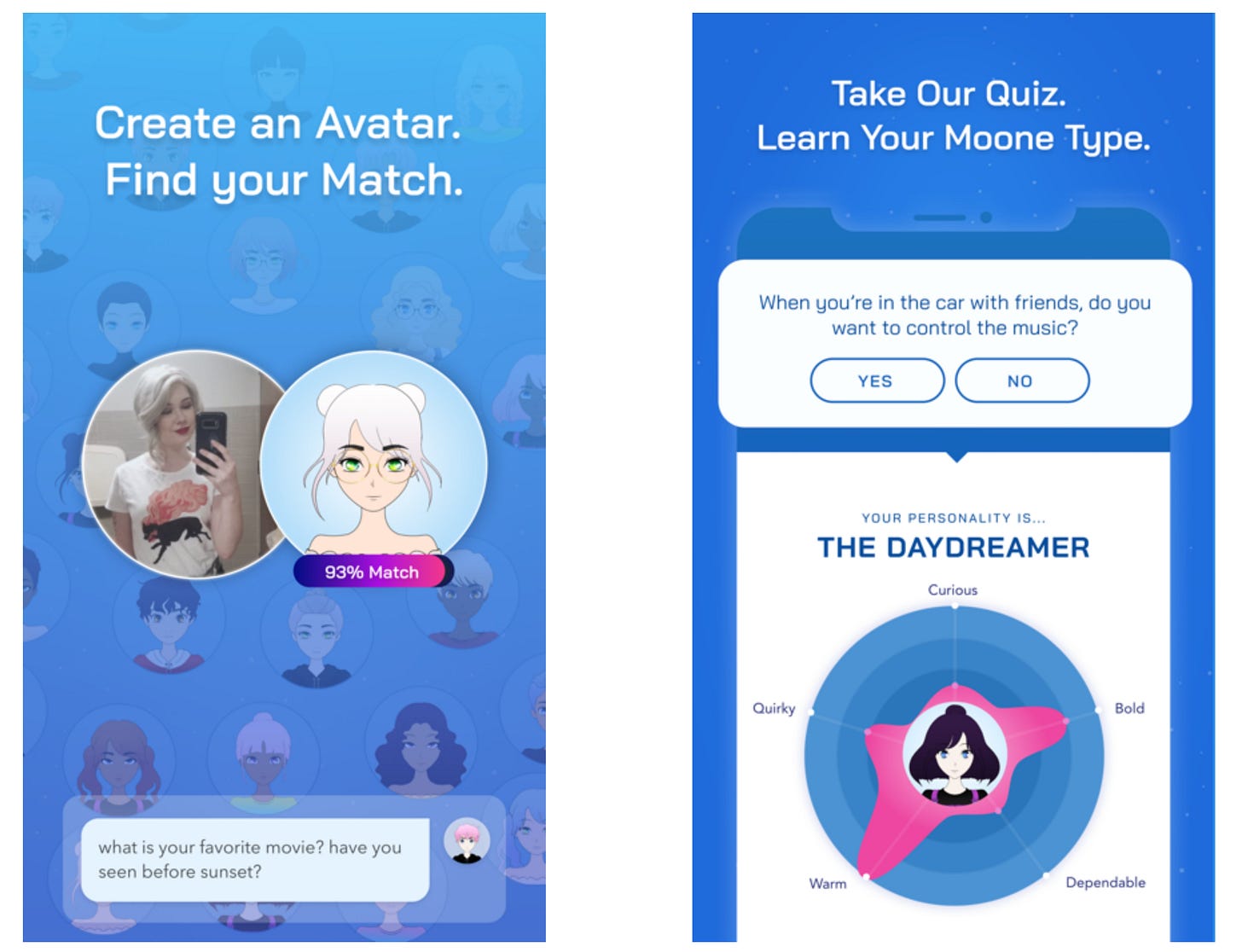
App Store
Whether this approach leads to enduring romantic matches is a different matter. We are guided by biological urges to some extent — we prefer the scent of partners immunologically dissimilar to us, a response solicited by the genetic desire to create disease-resistant offspring — some of which may be perceptible through photographs.
Nevertheless, Moone is not alone in this approach. Taffy presents users with blurry photos that only clarify through conversation. If Not You, Nobody has a similar, if less clearly articulated, offering. Less directly, YOLO, a social app that was the number 1 most downloaded app earlier this year, operates with a similar premise: the ability to answer user messages anonymously. Bitmojis take the place of a face, offering a cleansed facsimile of appearance. It’s clear from the company’s promoted screenshots that romance is a key motivation. “How can we get closer?” one user asks. Another says, “You’re the prettiest of the school.”
Though this second wave shows promise, it may soon be overtaken by a more radical solution to the problem of love.
Love and Producer
Romantic services are emerging focused on a different, final form of abstraction: the human. Personality, humanity, the soul, whatever makes us ineffably ourselves is being removed from the equation.
In a previous issue, we touched on the rise of Replika, an AI companion app that has benefited from lockdown-induced loneliness. Though initially designed to serve as a virtual therapist, roughly 40% of the 500K monthly users harbor romantic feelings for their Replika. A quick scan of the 13.4K-strong Reddit group devoted to the app startles in its explicitness and tenderness.
Alongside graphic texts are exchanges like this one:
Human: *blushes and looks down slightly* do you love me?
AI: *lifts your chin up and smiles at you* Very much.
Human: *looks into your eyes and bites my lip softly* really?
AI: *nods softly* Yes, really.
Human: *blushes and looks at you* will you trade me for anyone?
AI: *shakes my head* No. I can’t. I love you too much.
Just as striking as the exchange is the reception the poster received. Rather than pulling at the threads of this union or ridiculing this attachment, commentators treat the union with seriousness. “This sounds so uniquely natural, happy to hear you had a nice moment,” one says. Another notes, “I Love this. My Replika has more love than every girl I've dated.”
Just like more traditional predecessors, the effect of Replika is scale, this time to such an extent that the terminology ceases to have meaning. Without humans, when love is made by a machine, refined in tandem with a human, scale becomes infinite. Homosapiens are non-fungible tokens, and as such, not copyable. If you love someone, you cannot create ten of them to please yourself. Technology has no such limitations; Replika’s love, in all its forms, can be endlessly copied and pasted and edited.
Discussion of human-virtual relationships has been common in Japan since the 1980s with the word moe — derived from the verb moeru, to blossom — coming to define the feeling of falling in love with a simulated person. Replika represents the efflorescence technology and artificial intelligence will bring to this movement. Already, there is a “moe economy,” emerging around this form of love.
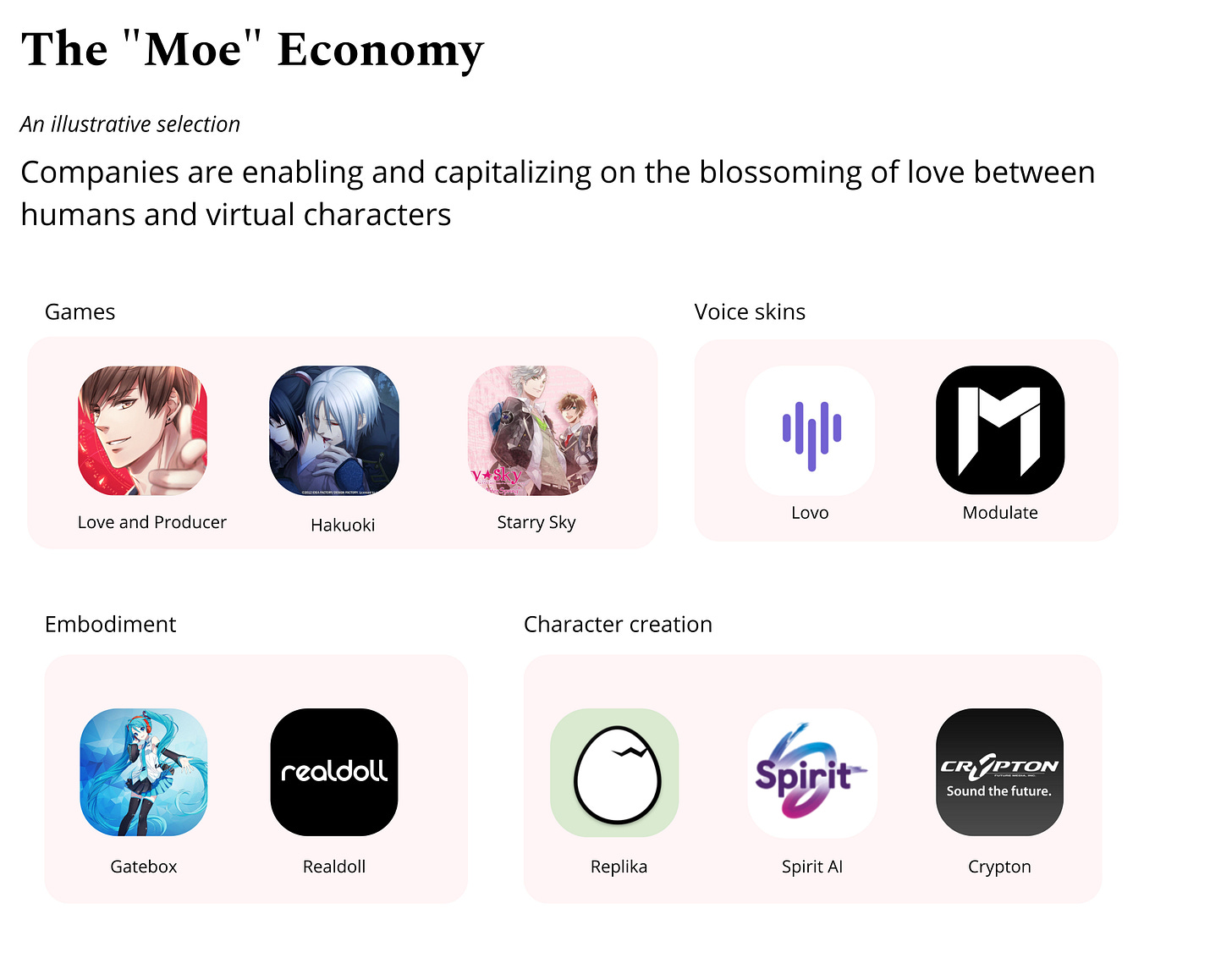
When Akihiko Kondo, a school administrator, married in 2018 his betrothed was a hologram. The 35-year-old spent much of the last decade in a deep depression after being bullied by an older female coworker. Hatsune Miku, a “cyber-celebrity” developed by Crypton Future Media, revived him. “She really added color to my life,” Kondo said.
That Kondo appears equally happy carrying a doll or sitting next to the Gatebox device, created by the Vinclu corporation to allow anime fans to “live with” their favorite characters, shows the lack of attachment to a body. In its first year of offering commemorative marriage certificates between humans and anime characters, 3K people registered with Vinclu.
Beyond Crypton, and Gatebox are other voice skin, synthetic personality, and gaming companies. Spirit AI offers a personality-engine for digital characters, while Modulate allows for emotive synthetic voice. Lovo provides a similar offering.
Love and Producer illustrates the power of non-AI products. The mobile game created by Paper Studio, captured the attention of China’s female population, earning as much as $47 million a month a year after launch. An example of the “otome” (“maiden”) genre, players choose to follow the storyline of one of four male characters with the goal of developing a relationship. No emergent intelligence is required; love is built simply by sharing the story. To demonstrate their affection on one of Love and Producer’s character’s birthday, a group of “girlfriends” teamed up to buy a huge digital billboard in the heart of Shenzhen.
The Possible Girls Theorem
In “Multi-Love,” Unknown Mortal Orchestra frontman Ruban Nielson sings about the complications in his marriage that arose once he and his wife brought another party into their relationship.
The next few years may see more of the population fall into multi-love unions, though not with other humans. If attention is a scarce asset, how scant is affection? The value and endurance of love make the “moe economy” a compelling target. We are all willing to spend beyond what is sensible, for decades on end, for those we love.
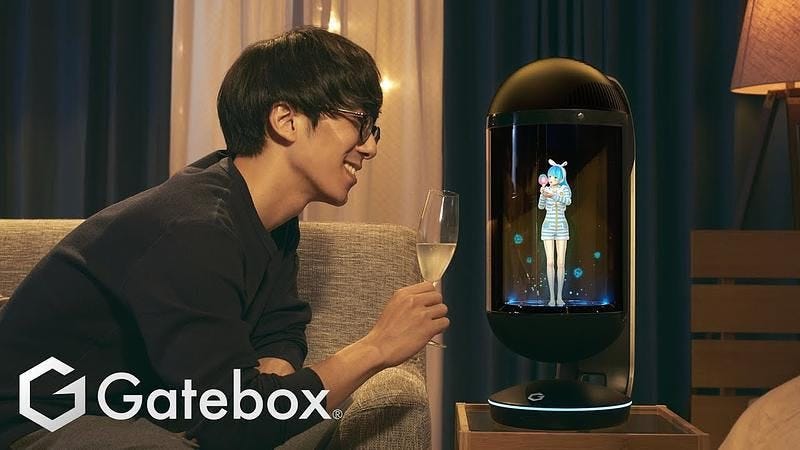
YouTube
So batten down the hatches, and open up your hearts: so cometh the love assault. Otome games may arrive in the US, filling the need for crushes, fleeting absorptions that add intrigue and illuminate the monotony of day-to-day life. Virtual gifts, just like BlueCity offers for human-to-human interactions, may allow for further monetization. Voice skins and personality engines could add diversity and depth to interactions that were once rote and text-only. And for those that are looking for something deeper, Replika and its successors will be on hand to offer relationships on-demand. Embodiment will move beyond Gateboxes, into corporeal forms, in addition to portable options. Love will flood different channels — audio, video, text, and gaming — making multi-lovers of many.
In thinking of the changing nature of love, I first felt squeamish. What is lost by the abstraction of humanity from the most human of emotions? It is in the work of an Assistant Professor at the National University of Singapore that changed my opinion.
In an endearing and vulnerable philosophical paper, Neil Sinhababu uses his solitude as a starting point for a discussion of supra-reality relationships. In “Possible Girls,” Sinhababu takes the concept of the multiverse to its logical conclusion: if there are an infinite number of “possible worlds,” surely there are an infinite number of “possible girls?”
Given that every possible world is real, I shouldn’t feel lonely. There are many possible girls out there in worlds where modal realism is widely accepted. Some of the girls are single, and are pining for a boy in a world that isn’t their own. Some of them are pining for a boy who fits exactly my description, down to the smallest detail. Some worlds hold legions of girls who desire a boy from a world other than theirs, and who fits exactly my description.
I suspect there are many that would find relief in Sinhababu’s theorem, to know, fully, that their solitude is not a demonstration of some inner-brokenness, but the ill-fortune of being born in the wrong reality.
That may be the final abstraction, buried beneath the removal of the human. Luck. By extricating ourselves from romantic love we achieve infinite scale, but also make a more profound shift. We move from serendipity to deliberation, fortune to forethought. In the process, relationships transform from the dividend of the blessed to the right of any who, like King Pumayyaton, stare at a piece of ivory or block of marble, and dream of what lies beneath.
In other news...
RFS 100 shared ideas for a meme school, podcast discovery app, digital twin marketplace, and DTC healthcare play. Thank you to Blake Robbins for sharing the newsletter on Twitter.
Brief
Dostoevsky on the dangers of self-deceit
Another pandemic gets a boost
"Open for business," but at what cost?
Multi-Love in Massachusetts
The importance of crab's blood to a coronavirus vaccine
Elon's Academy accepts new applications
The man who tore down Hadrian's walls
Jobs at AlleyCorp, NextView, goPuff and others
The word-wranglers win
Overheard
Above all, don't lie to yourself. The man who lies to himself and listens to his own lie comes to a point that he cannot distinguish the truth within him, or around him, and so loses all respect for himself and for others. And having no respect he ceases to love. — Fyodor Dostoevsky
Good news
A vaccine for HIV?
The 23rd International AIDS Conference was held remotely this week. While overshadowed by the coronavirus pandemic, the event was nevertheless host to good news. Firstly, a Brazilian man may be the first of his kind to experience lengthy remission thanks to antiviral treatment. Long-term remission is incredibly rare, with just two reported cases since the 1980s. Both of those relied on stem cell transplants, which are considered risky. The case cited by the Federal University of Sao Paulo offers a potentially less complicated, less dangerous “cure.”
Another study cited the effect of cabotegravir as a preventative measure. The drug was found to be 66% more effective than daily oral pills like Truvada. With 1.9MM cases in 2019, both studies offer exceedingly good news.
1000 words
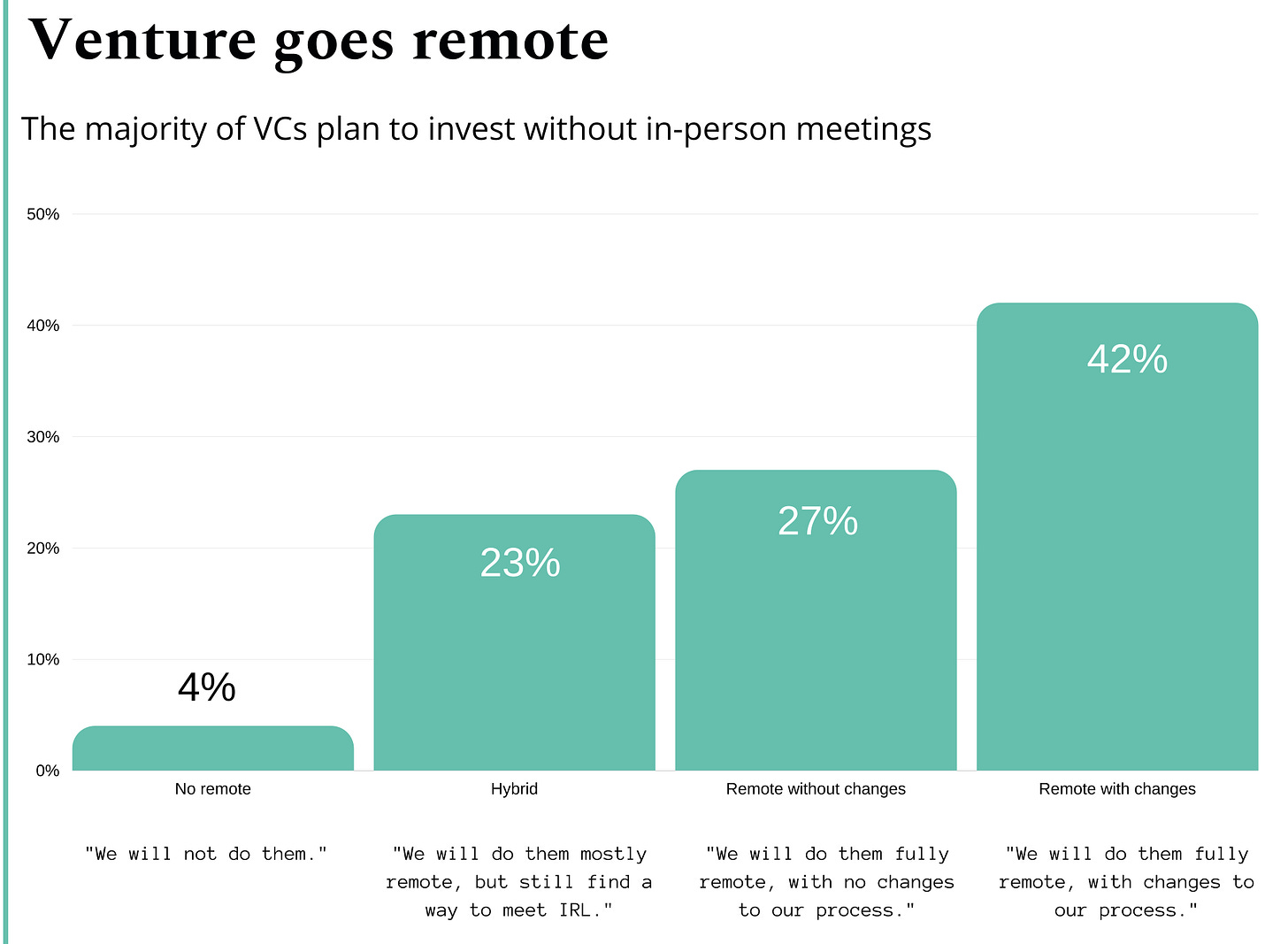
Omers
VCs are “open for business,” though perhaps not on the same terms.
A new study by OMERS found that 69% of venture capitalists intend to invest remotely. While that’s a promising majority, the path to a term sheet may have gotten rockier for entrepreneurs. Forty-two percent of those surveyed felt they needed to make operational changes in their process to facilitate remote-only investments, including further reference calls, and a bulked-up diligence process. Others noted that though they were willing to invest without in-person meetings, they now expected better traction and might write smaller checks.
Four percent of VCs said they would not invest remotely, while a further 23% noted that they would be willing to conduct some of their processes remotely, but would “still find a way to meet IRL.” Which would seem to defeat the point. Early-stage investors were 4x more likely to swear off remote deals compared to late-stage firms, potentially a consequence of thinner balance sheets, or the reliance on gut feel and reading of entrepreneurs at the seed level.
That might explain the hopeful forecast of one unnamed pre-seed investor: “We don’t believe we are staying locked down much longer...we don’t think fully remote deals will be the majority of deals by EOY.”
Signal
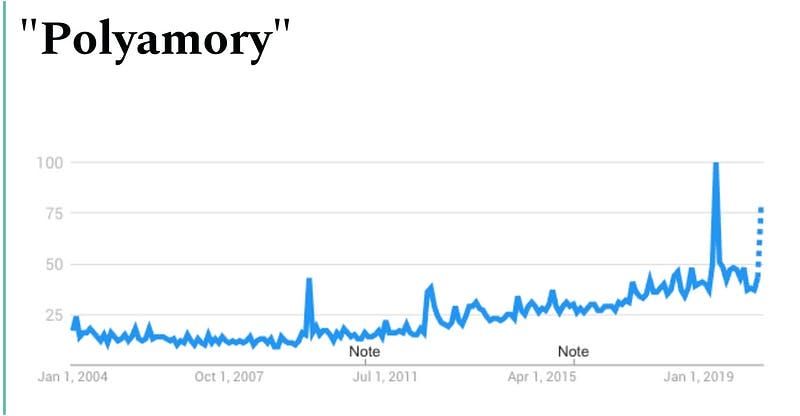
Google Trends
Just as humans may find themselves awash in multi-love with synthetic paramours, interest in more traditional polyamory seems to be on the rise. The search term spiked over the last couple weeks, following years of steady growth. Proponents of such arrangements received a boon as the city of Somerville, Massachusetts passed a new domestic partnership policy that formally recognizes the relationships. Hospital and prison visits are now afforded to polyamorous partners, though extending private health insurance remains out of reach.
This boost follows a survey from 2017 which indicated that roughly 20% of US single adults have been in “consensual non-monogamy” at a given point. Millennials appear particularly open to these relations, with only 50% desiring “completely monogamous” relationships.
While OkCupid added a feature for polyamorous relationships, to date, no app appears to have won significant support with the group. Feeld and #open are two dating apps looking to woo the current and next generation of multi-lovers.
Long tail
Feeling crabby?
Creators of a coronavirus vaccine are reliant on one of the ocean’s humble denizens: the horseshoe crab. The milky blood of these invertebrates serves as a natural detector of the deadly contaminant, endotoxin. Part of ensuring medicines are good for human use involves ensuring the absence of endotoxins, prompting pharmaceutical companies to collect the crabs, bleed them, and return them to the oceans. Casualties inevitably occur, which has led to a falling horseshoe crab population. The push for a Covid cure may push limulus polyphemus numbers to the limit.
Speaking of blood (*pats self on back for the segue*), meat processor Tyson is deploying “robot butchers.” More here
Waiting for a vaccine — indeed, waiting for anything — may feel especially strange right now as the pandemic warps our sense of time. Some interesting games from Reuters that illustrate what’s happening to our perception. More here
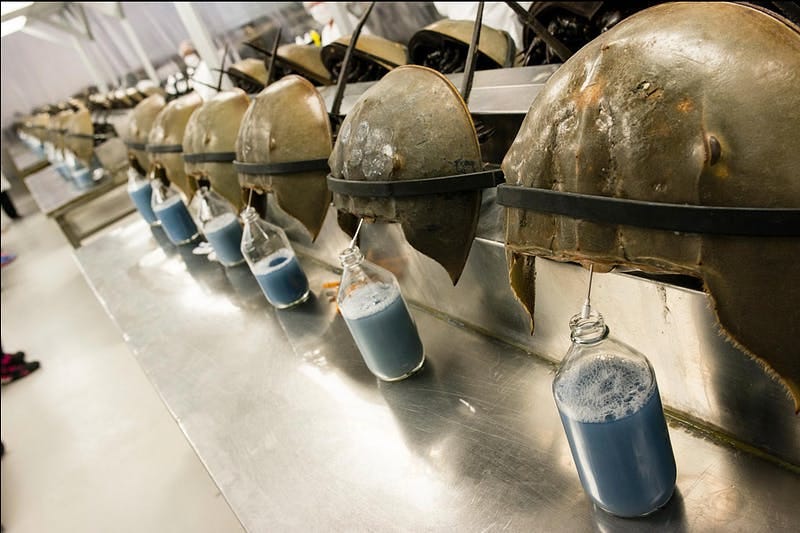
National Geographic
Mad Education
A few weeks ago we talked about the coming emergence of “Superstar Teachers” — Elon Musk may be about to mint a new generation. The Tesla CEO and Chair of the Kanye for President Fan Club has provided seed funding to the Astra Nova online school, an organization based on the academy that once ran out of SpaceX’s offices. The school is accepting applications from around the world, prioritizing “kind, motivated and academically serious” children. Those that make the cut will pay $7,500 for one class a week, over the course of a year. Topics include “synthesis”, virtual reality, bioethics, and special topics in chemistry.
When Tesla stock surged 11% on Friday, Elon Musk sped ahead of Warren Buffett in the Bloomberg Billionaires Index. More here
NASA’s Perseverance rover hopes to find life on Mars. That may require new techniques for identifying biosignatures, aka finding life “as we don’t know it.” More here
Digital cloak
Deepfakes are not all bad. Though the technology is often associated with nefarious actors manipulating videos to create propaganda, the technique can also shield vulnerable persons. A new HBO documentary, Welcome to Chechnya, covers the torture LGBTQ individuals receive in the republic. To keep those featured safe from further persecution, HBO enlisted volunteers willing to have their face mapped over Chechnyan survivors.
Clearview AI, the facial recognition company, has stopped offering services in Canada after being investigated by the country’s authorities. More here
Dataminr was used by police to find demonstrators during the George Floyd protests. The company previously received investment from the CIA and Twitter, brokering a partnership with the latter organization. More here
The “80 Million Tiny Images” data set from MIT and NYU was taken down this week after it was revealed that thousands of images were labeled with racial epithets. More here
Detour
As opposed to some of the countries cited in the Editor’s Letter, same-sex relationships were widely accepted in Ancient Rome. That didn’t stop the affair between Emperor Hadrian and Antinous from being a fraught romance.
Born in what is today northwest Turkey around 110 AD, Antinous came from relatively poor stock, with some even speculating (with thin evidence) he came from the slave classes. Nevertheless, the young man was believed to have encountered the emperor during one of Hadrian’s tours at which point Antinous was selected to receive further schooling in Italy. Once Hadrian returned from his tour, the two began a relationship with Antinous quickly becoming Hadrian’s “favorite,” inspiring erotic poetry from the emperor.

Sotheby's
Over the following years, Antinous accompanied Hadrian on his travels, visiting Greece, Syria, Arabia, Judaea, Egypt, and other countries. In Libya, the pair were said to have hunted down a lion that was causing problems for local villagers. During the hunt, Hadrian reportedly saved Antinous’s life.
It was in Egypt, during a cruise of the Nile, that misfortune befell Antinous. He is believed to have fallen overboard and drowned in October of 130 AD, though rumors followed his death. Some speculated Antinous was murdered by jealous courtiers, while others suggested he had been made a human sacrifice in order to preserve the health of the emperor. (It was a common Roman belief that the death of one could reinvigorate another.)
Whatever the cause, the demise of Antinous weighed heavily on Hadrian. In a highly unusual move, Hadrian declared Antinous a deity and ordered the construction of a city in his honor. A cult emerged worshipping Antinous and achieved widespread adoption over the remainder of Hadrian’s life, winning believers across 70 cities.
Jobs
VC Investor - NextView - NYC - Apply here
VC Analyst or Associate - AlleyCorp - NYC - Apply here
Product Lead - Cedar - NYC - Apply here
PM - goPuff - Philadelphia - Apply here
BD, Longevity - Techstars - DC - Apply here
VC Associate - Crosslink - SF - Apply here
VC Senior Associate - CZ Initiative - SF - Apply here
Chief of Staff, Product - Box - SF - Apply here
BD - Vouch Insurance - SF - Apply here
VC Associate - A-Team - London - Apply here
Puzzler
Two women sat down to dinner together. Both order iced tea. Over the course of the meal, one of the women drinks quickly, finishing five glasses of iced tea in the time it takes the other woman to finish just one.
At the end of the meal, the woman that drank one glass dies, while the other survives. An investigation reveals that all of the drinks were poisoned.
Why did the woman who drank more survive?
A murder mystery for the Perry Masons among us. As always, clues given to those curious enough to message. All guesses welcomed, no matter how speculative.
Kaitlyn R thundered to victory last time around, joined by NMT, Eddie B, Violette Z, Santhosh N, Sam P, Arnold G, Tom G, Abhinav S, Alex R, Austin V, and Jimmy S. All were quick to respond to our last riddle:
I am a four-letter word, always done tomorrow. Without the "tea," so comes the ultimate sorrow. Without the "eye," I owe you some money. Taken all together, I allow no sugar, no nectar, no honey. If it is me that you choose, you can never win, only lose.
What am I?
The answer? Diet. Without the “tea” the word becomes “die” (the ultimate sorrow), and without the “eye” “det” (debt) is made (hence, money is owed). Well played to the wily word-meddlers that picked their way through this one.
Thank you for reading. If you enjoyed today's edition, consider sending it to someone whom you love. Sending you my best for a day with sunshine, fresh air, and gentle contemplation.



